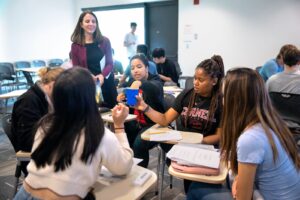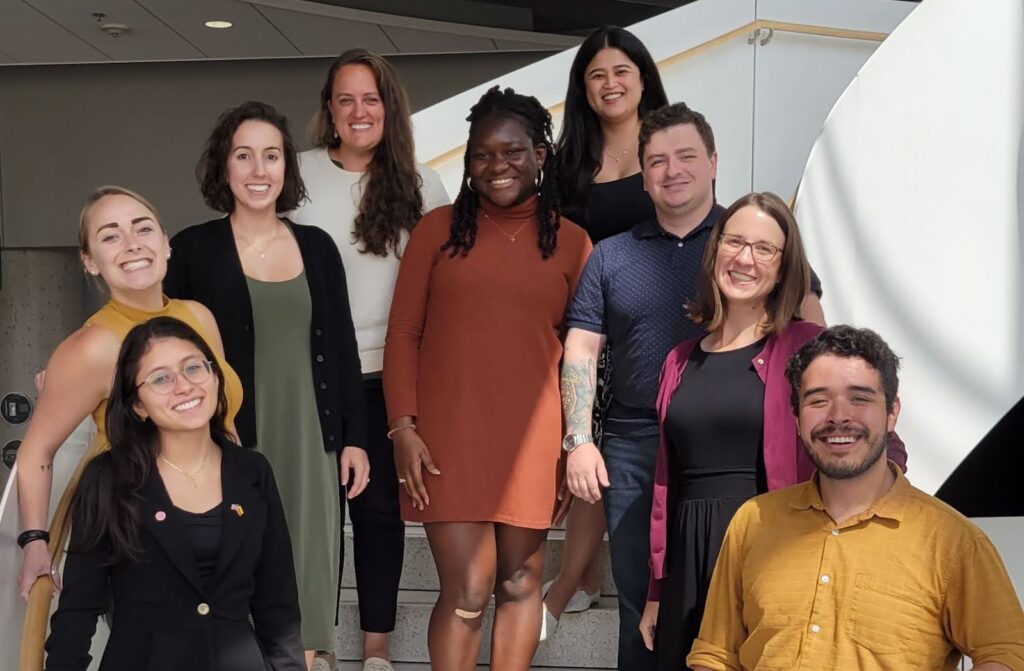Hanson Center Visiting Scholar 2023-2024: Dr. Michelle Smith

Dr. Michelle Smith
Ann S. Bowers Professor of Ecology and Evolutionary Biology and Senior Associate Dean for Undergraduate Education, Cornell University, Ithaca, NY
Dr. Smith is a renowned teacher-scholar who has published significant work on evidence-based ways to improve STEM education. Her research employs multi-methods to advance teaching practices and curricula that have significant impact on the learning of all students. Dr. Smith and her colleagues have also studied the most effective ways to support faculty who want to implement changes to their pedagogy and courses. She has published widely on such topics as the effects of active learning on student learning and success, the strategies to best support students’ transition from high school to college, the use of open-access resources on social justice in education, and the influence of engaging in undergraduate research on students’ learning and identities as scientists. The journal Nature recently highlighted Dr. Smith for her work on the science of teaching.
Program for AY 23-24
We selected the following four areas on which to focus during this yearlong program and relevant publications by Dr. Smith for each of the four areas are listed at the end of this announcement:
- How can we better support student transition from high school to college?
- What are our students learning during research experiences and how can we enhance this learning?
- What does journaling during courses tell us about the learning experiences of our students and how can we be most effective in introducing journal reflections in our courses?
- What is the impact of active learning and how can you enhance this practice in your own classes?

Michelle Smith uses a modeling activity to teach students in a non-majors evolution course.
[Cornell photo]
Schedule
THURSDAY, November 9 – FRIDAY, November 10, 2023
VIRTUAL SESSION
Thursday, November 9
- 4:15 – 5:15, Zoom Presentation by Dr. Smith, “Undergraduate Research and Field Experiences: What are students engaging in and learning?”
- Abstract: During undergraduate research and field experiences, students are learning to engage in the work of practicing scientists. This talk will highlight what is currently known about student learning outcomes during these experiences, and discuss new approaches to measuring critical thinking, student affect, and the connections students make with their peers and mentors. These results can be used to provide practical advice to instructors, including ways to promote equity and inclusion during research and field experiences.
THURSDAY, FEBRUARY 1, 2024
VIRTUAL SESSION
- 4:15 – 5:30 Seminar via Zoom: “Using Classroom Observations to Provide Instructors with Formative Feedback”
- Abstract: Instructors, and the teaching practices they employ, play a critical role in improving student learning in college courses. Consequently, there is increasing interest in collecting information on the range and frequency of teaching practices at department-wide and institution-wide scales. To help facilitate this process, I will present the Classroom Observation Protocol for Undergraduate STEM (COPUS): a protocol that allows individuals, after a short training period, to reliably characterize how instructors and students are spending their time in the classroom. I also will discuss how classroom observation data can be used to guide individual and institutional change.
THURSDAY, APRIL 4 – FRIDAY, APRIL 5, 2024
On-campus Visit
Thursday, April 4
- 4:15 – 5:15 Open Educational Resources Symposium
- 5:45 – 7:30 Dinner, Discussion, and Celebration of the Accomplishments and Program
Friday, April 5
Morning – Lunch
- Small meetings with faculty, staff, and students.
____________________________________________
Dr. Smith’s Scholarship

Members of the Cornell Ecology and Evolutionary Biology education research laboratory present their research at the Society for the Advancement of Biology Education Research meeting.
[Michelle Smith photo]
Effects of Active Learning on Student Learning and Success
Pelletreau KN, Knight JK, Lemons P, McCourt J, Merrill J, Nehm R, Prevost L, Urban-Lurain M, Smith MK. “A faculty professional development model that improves student learning, encourages student-centered instructional practices, and works for geographically separated faculty.” CBE-Life Science Education. 2018 17(2):es5. https://doi.org/10.1187/cbe.17-12-0260
Smith MK, Wood WB, Adams WK, Wieman C, Knight JK, Guild N, Su TT. “Why peer discussion improves student performance on in-class concept questions.” Science. 2009 323(5910):122-124. https://doi.org/10.1126/science.1165919
Stains M, Harshman J, Barker MK, Chasteen SV, Cole R, DeChenne-Peters SE, Eagan MK, Esson JM, Knight JK, Laski FA, Levis-Fitzgerald M, Lee CJ, Lo SM, McDonnell LM, McKay TA, Michelotti N, Palmer MS, Plank KM, Rodela TM, Sanders ER, Schimpf NG, Schulte PM, Smith MK, Stetzer M, Van Valkenburgh B, Vinson E, Weir LK, Wendel PJ, Wheeler LB, Young AM. “Anatomy of STEM teaching in North American universities.” Science. 2018. 359:1468-1470 https://doi.org/10.1126/science.aap8892
Freeman S, Eddy SL, McDonough M, Smith MK, Okoroafor N, Jordt H, Wenderoth MP. “Active learning increases student performance in science, engineering, and mathematics.” Proceedings of the National Academy of Sciences of the United States of America. 2014 11(23):8410-8415. https://doi.org/10.1073/pnas.1319030111
Strategies to Best Support Students’ Transition From High School to College
Meaders C, Lane AK, Morozov AI, Shuman JK, Toth E, Stains M, Stetzer MR, Vinson E, Couch BA, Smith MK. “Undergraduate student concerns in introductory STEM courses: What they are, how they change, and what influences them.” Journal for STEM Education Research. 2020 https://doi.org/10.1007/s41979-020-00031-1
Meaders C, Toth E, Lane AK, Shuman JK, Couch BA, Stains M, Stetzer MR, Vinson E, Smith MK. “What will I experience in my college STEM courses? An investigation of student predictions about instructional practices in introductory courses.” CBE-Life Sciences Education. 2019 18(4):ar60. https://doi.org/10.1187/cbe.19-05-0084
Lane AK, Meaders C, Shuman JK, Stetzer MR, Vinson E, Couch BA, Smith MK, Stains M. “Making a first impression: Exploring what instructors do and say on the first day of introductory STEM courses.” CBE-Life Sciences Education. 2021 https://doi.org/10.1187/cbe.20-05-0098
Meaders C, Senn LG, Couch BA, Lane AK, Stains M, Stetzer MR, Vinson E, Smith MK. “Am I getting through? Surveying students on what messages they recall from the first day of STEM classes.” International Journal of STEM Education. 2021 https://doi.org/10.1186/s40594-021-00306-y
Use of Open-access Resources on Social Justice in Education
Smith MK. “Publishing activities improves undergraduate biology education.” FEMS Microbiology Letters. 2018 365:11. https://doi.org/10.1093/femsle/fny099
Diaz Eaton C, Bonner K, Cangialosi K, Drewsbury B, Diamond-Stanic M, Douma J, Smith MK, Taylor R, Wojdak J, Wilfong K. “Sustainability and justice: Challenges and opportunities for an open STEM Education.” CBE-Life Sciences Education. 2022 https://doi.org/10.1187/cbe.20-08-0180
Influence of Engaging in Undergraduate Research on Students’ Learning and Identities as Scientists
Treibergs K, Esparza D, Yamazaki J, Goebel M, Smith MK. “How do introductory field biology students feel? Journal reflections provide insight into student affect.” Ecology and Evolution.2022 http://doi.org/10.1002/ece3.9454
Treibergs KA, Esparza D, Yamazaki JA, Smith MK. “Journal reflections shed light on challenges students face in an introductory field biology course.” Ecosphere. 2023 https://doi.org/10.1002/ecs2.4509